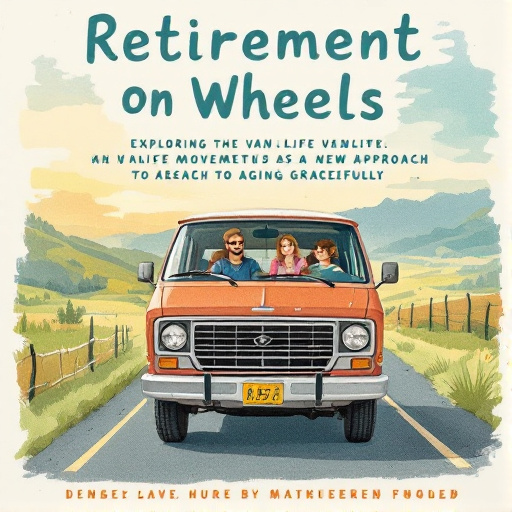Featured Articles
- Retirement Adventures: Exploring the Growing Trend of 'Retirement Sabbaticals' for a Fulfilling Future
- "Retirement in the Metaverse: How Virtual Real Estate Might Shape Your Golden Years"
- "Retirement on Wheels: Exploring the Vanlife Movement as a New Approach to Aging Gracefully"
- Retirement Planning for the Unplugged: Embracing Minimalism and Digital Detox Before You Retire
- "Retirement Reimagined: Exploring the Rise of Eco-Friendly Living for Seniors in a Post-Pandemic World"
"Retirement Reimagined: Exploring the Rise of Eco-Friendly Living for Seniors in a Post-Pandemic World"
"Retirement Reimagined: Exploring the Rise of Eco-Friendly Living for Seniors in a Post-Pandemic World"
The post-pandemic world has witnessed a groundbreaking shift in lifestyle preferences, particularly among seniors, who are increasingly embracing eco-friendly living. This article explores how retirees are reimagining their golden years through sustainability and a profound connection to nature, reflecting a desire for mindfulness and community engagement.
Understanding Eco-Friendly Living
Eco-friendly living refers to a lifestyle that aims to minimize one's carbon footprint and reduce waste, advocating for the health of the planet. As the climate crisis becomes increasingly urgent, many seniors are finding that adopting sustainable practices aligns with their values and offers numerous benefits, both personally and environmentally.
Statistics That Spark Change
According to a 2021 report from the United Nations, approximately 70% of the elderly population believes they have a responsibility to protect the planet for future generations. This newfound commitment is impacting various aspects of their lives, from how they shop to where they live.
A Shift in Retirement Choices
The seismic shifts caused by the COVID-19 pandemic expedited many seniors' transitions to eco-friendly living. In the past, era retirement often meant downsizing to warmer climates, but increasingly, retirees are opting for co-housing communities that emphasize sustainability. For instance, a case study from the "Sustainable Aging" project in Austin, Texas, demonstrated that community gardens and shared resources not only reduce living costs but also foster strong social bonds among residents.
The Role of Technology
Imagine this: a 70-year-old grandmother, Mary, struggling with her old flip phone, suddenly becomes a tech whiz! Armed with an iPad, she joins virtual workshops on sustainable gardening and attends online sessions about eco-friendly practices. Technology is bridging the gap for seniors, making it easier than ever to learn about renewable energy and eco-friendly advancements in real time. A survey conducted by the Pew Research Center indicates that 65% of seniors now engage with the internet, gaining access to information that is shaping their sustainable practices.
Storytelling Through Eco-Consciousness
Take the story of John, a retired teacher who made headlines in his town for his rooftop garden project. After realizing how much waste he was generating during lockdown, he embarked on a journey to turn his small suburb into a green oasis. Now, John hosts workshops, teaching other seniors the importance of composting and organic gardening. His story not only empowers others but also creates a ripple effect in the community, inspiring many to think green.
Integrating Nature into Daily Life
One of the ways seniors are reconnecting with nature is through outdoor activities like hiking, biking, and bird-watching. A study conducted by the National Institute on Aging found that regular engagement with nature can significantly improve physical and mental well-being in older adults. Walking in the fresh air, whether by the beach or through a forest trail, can lower stress and increase feelings of happiness. Imagine the sight of a group of seniors donned in walking shoes, enthusiastically embarking on natural trails, laughing, and sharing their stories—talk about a rejuvenating experience!
Eco-Friendly Housing Trends
Seniors are also making eco-conscious choices regarding their living situations. Many are opting for energy-efficient homes or retirement communities that incorporate green building practices. According to a study from the American Association of Retired Persons (AARP), eco-friendly housing can lead to lower utility costs while promoting healthier environments. In other words, living sustainably not only protects the earth but also acts as a financial boon for retirees.
A Sense of Purpose
Adopting an eco-friendly lifestyle often brings a renewed sense of identity and purpose, particularly in retirement. A survey by the Environmental Protection Agency (EPA) indicated that seniors actively engaged in sustainability efforts report higher satisfaction levels. This shift allows them to harness their years of experience and wisdom, contributing to community efforts such as tree-planting initiatives or local recycling programs.
The Ripple Effect
What's truly fascinating is how the community dynamics shift when seniors advocate for sustainability. For instance, a group of retirees in a coastal community established a "Clean Coast" initiative, organizing bi-weekly beach clean-ups. These events not only enhance the environment but also encourage intergenerational participation. Young volunteers from local schools join hands with their elder counterparts, sharing skills and insights, ultimately knitting a stronger community.
The Psychology of Green Living
Scientists have found that engaging with the environment positively impacts mental health. According to findings from the Journal of Environmental Psychology, being in nature can decrease feelings of anxiety and depression—two issues that often plague seniors. There’s something about the sound of leaves rustling and birds chirping that just lifts the spirit, making eco-friendly living a natural remedy for life’s challenges in retirement.
Access to Resources and Information
In the age of information, numerous resources are available to seniors wishing to embrace eco-friendly living. Online platforms, community organizations, and local government initiatives provide workshops, subsidies, and even grant programs aimed at promoting green initiatives. For example, cities across the U.S. are offering incentives for elderly residents to switch to solar panels or purchase energy-efficient appliances.
The Future of Eco-Friendly Retirement
As the world continues to grapple with environmental challenges, it's clear that the trend toward eco-friendly living will only intensify. With the incredible innovations in renewable resources, waste management technology, and community engagement strategies, seniors today have ample opportunities to contribute to a healthier planet. Our role as future generations will be to ensure that sustainable choices remain accessible and enticing for seniors.
Persuasion through Personal Responsibility
Consider for a moment: if we all contributed just a small part of our lives to living sustainably, the positive impact would be astronomical. Seniors, with their wealth of experience and insight, have an invaluable role to play in this narrative. By leading the charge, they set an example for all, advocating for future generations and reinforcing the importance of preserving our earth.
Building Community Through Sustainability
Leading sustainable initiatives cultivates community spirit, and seniors are crucial in this mission. Those looking for this kind of engagement can find local groups or even virtual communities online dedicated to eco-friendly practices. Imagine organizing neighborhood potlucks focused on “farm-to-table” dinners, where seniors share their homegrown produce, fostering not just a green initiative but also a stronger bond among residents. It’s a win-win situation!
Conclusion: Beyond Retirement
The implications of eco-friendly living extend well beyond individual benefits, resonating throughout families, communities, and the planet. In a post-pandemic world, as seniors reimagine their retirement years, they forge paths toward sustainable living that ensures a healthier environment for younger generations. With this shift, they transform not only their lives but also the lives of those around them, leaving a legacy that echoes for years to come.
So let's raise a toast—perhaps with a glass of organic homemade lemonade—to the vibrant seniors who are paving the way for a sustainable future. Let their tales of courage and creativity inspire you to consider how you, too, can contribute to a greener world, regardless of your age!




